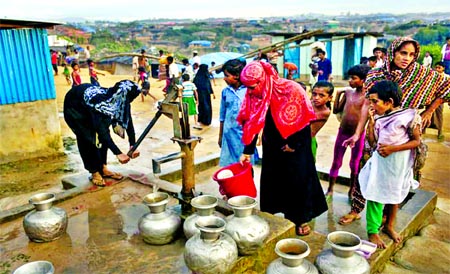
Staff Reporter :
According to World Health Organization (WHO), 62 per cent of water supplied to Rohingya households is contaminated.
Water lifted from wells in the Rohingya camps is contaminated risking adult and child health. It is spreading fast. Increase of Acute Watery Diarrhoea (AWD) has caused several deaths, said a UNICEF press release.
Between 25 August and 11 November 2017, a total of 36,096 AWD cases were reported including 10 deaths. A total of 42 per cent (15,206) were in the under-5 age group. An upward trend is being observed. Truly the exact cause of increased cases of AWD remains uncertain, it may be linked to contaminated food or water.
Since 25th August, about 621,000 Rohingyas arrived in less than three months,UNICEF and partners have been working to ensure the provision of safe drinking water, latrines and sanitation systems inside the refugee camps.
UNICEF expressed deep concern over the high levels of bacterial contamination (E.coli) from water lifted from wells inside the Rohingya refugee camps in Cox’s Bazar in southern Bangladesh.
Some of the tube wells inside the camps have been dug to shallow depths are very congested and do not have safeguards in place to prevent bacterial contamination at ground level. UNICEF has been working with its WASH partners to install tube wells which meet international standards by ensuring a depth of at least forty meters and by ensuring that all tube wells have an appropriate ceiling.
Contamination may flow through poor hygienic practices such as the use of dirty containers, bad hygienic habits of the population in water handling. Based on an analysis of the risk, UNICEF is working with the Bangladesh authorities to urgently investigate levels of contamination, and to ensure sinking of tube wells that meet international standards.
UNICEF is also distributing water purification tablets for water treatment at the household level as well as promoting good hygienic practices. The provision of safe drinking water has been one of the highest priorities for UNICEF in responding to the needs of Rohingya refugees.
Though the UNICEF is distributing around 195,000 liters daily to over 50,000 people through water treatment and installed more than 420 tube wells serving some 1, 40,000 people, water borne diseases are spreading and threatening people lives.

